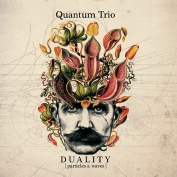




 NEXT
NEXT
 BACK
BACK

Philosophical musings on Quanta & Qualia; Materialism & Spiritualism; Science & Religion; Pragmatism & Idealism, etc.



 Recent Posts
Recent Posts
Quantum MInd?
Post 15. 02/11/2018 continued . . .
Cosmopsychism vs Enformationism
Quantum Particles; Pieces of Mind?
A "virtual" particle is defined as " . . . not a particle at all. It refers precisely to a disturbance in a field that is not a particle." And a quantum field is a place that is not in space, but merely a mathematical description of the probability for real particles to appear from nowhere. This sounds a lot like Plato's ideal Forms, that under the right conditions can become real Things. So a virtual particle is essentially the idea of a real particle. Which sounds like a mental concept. But in whose mind?
Goff scoffs at the materialist assumption that mental properties mysterious emerge from complexes of physical properties. "It’s silly to say that atoms are entirely removed from mentality, then wonder where mentality comes from." This discrepancy is why the ancient theory of Panpsychism proposed that even matter is made of Mind (psyche). “Consciousness” is the most common term used to indicate that metaphysical “substance” of reality. But the term is misleading, so I prefer to use the more technical term Information in reference to the mind-
After pondering on the limitations of physics, "The English astronomer Arthur Eddington . . . argued that the only thing we really know about the nature of matter is that some of it has consciousness; we know this because we are directly aware of the consciousness of our own brains." Hence, Goff expanded on that observation, saying "We have no direct access to the nature of matter outside of brains. But the most reasonable speculation, according to Eddington, is that the nature of matter outside of brains is continuous with the nature of matter inside of brains." Consequently, "In my book Consciousness and Fundamental Reality (2017), I developed these considerations into an extensive argument for panpsychism: the view that all matter has a consciousness-
However, this modern revivial of Panpsychism is not intended to attribute feelings to atoms, but merely an ability to give and receive digital information in the form of energy inputs and outputs. On the Quantum level of reality, our continuous analog world seems to function like a computer, by processing distinct 1s & 0s without anything in between. But somehow those meaningless on/off switches add-
Regarding the concept of Holism, he says it "has a somewhat mystical association, in its commitment to a single unified whole being the ultimate reality. But there are strong scientific arguments in its favour. . . . The American philosopher Jonathan Schaffer argues that the phenomenon of quantum entanglement is good evidence for holism. Entangled particles behave as a whole, even if they are separated by such large distances that it is impossible for any kind of signal to travel between them." So, the holistic notion of Panpsychism can explain how two or more entangled particles can behave as-
Post 15 continued . . . click Next
